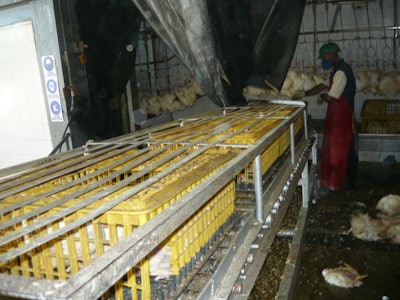
Poultry processing companies have a valuable resource that they do not always make the most of – their workers’ knowledge and experience. Companies need to educate staff, both when they join the organization and on promotion, and drawing on this body of knowledge could be valuable in both of cases.
Induction into new roles is generally organized by the human resources department in collaboration with the plant section or farm where the new person will work. Training staff are responsible for not only explaining the work to be done, but also company culture.
Inductions usually cover: what tasks that need to be carried out, situations that may prevent this from happening; the importance of quality, safety and yield and their impact on operating costs; and, the correct way of working.
Pre-slaughter training
Preslaughter training will cover areas including: feed withdrawal; trapping; capture and caging; and, truck loading.
The training session should include a worker with in-depth knowledge of the various activities that occur prior to processing. This person should detail the tasks that take place, putting particular emphasis on the most important.
Prior to capture, for example, feeders and drinkers should be raised. It is also important to mention that workers must move slowly to not be perceived as a threat by the birds, which may otherwise panic.
Birds must be captured by the legs but without applying so much pressure that bruising may occur. Poor treatment at this stage will become apparent later on. As cages are filled they should be placed onto a network of plastic tubes. Workers must work silently to prevent agitating the broilers.
Ideally, stacks of filled cages should be made on the truck trailer, reaching their final position without being lifted too many times. This should be done quickly. Trucks should be parked in natural or created shade to protect birds from heat stress.
Training for arrival at the plant
Anyone appointed to train in this area must have thorough knowledge the section’s operations.
They should explain how speed is maintained by the filled crates arriving in bulk with their doors open, and how the positioning of net over the cages can stop birds escaping.
Similarly, the importance of lifting birds to the shackles with care and preventing wing flapping, along with placing them into the shackles at 90 degrees, helps to prevent damage to the thigh.
Preventing preshock with electric stunning
This area’s expert must explain, among other things, how birds are rendered unconscious, how bleed quality can be compromised where parameters are not met, and how preshock can occur.
New recruits must understand the damage that can be caused by preshock and resultant wing flapping, for example. A full set of training materials should be available to illustrate this.
Deboning operations
Prior to entering the processing plant, the trainer must explain to new employees what is required of them to prevent quality and yield being compromised. This might include the ergonomic conditions of workstations, knife sharpening, ensuring optimal blade sharpness, how each cut is made and when to use each of the various knives.
A training center should have both fixed and mobile workstations to help new staff acquire the necessary work speed. Training materials are highly important and will help workers to remember the order of each of the cuts that they must make. Additional materials should be made available and regularly reviewed covering areas such as biosecurity and workplace safety.
Administrative team
All administrative staff should have a basic understanding of live and processed birds, including their physiology and microbiology, with materials prepared by those responsible for each of the plant’s various sections.
This training will help office workers to feel more secure and they will be better placed to respond when their views are sought.
Special training programs
It is important to conduct reviews to ensure that a plant’s output is in-line with the wider industry, and this has become easier due to virtual working. Staff no longer need to leave their place of work for training or updates, making training investment increasingly low cost.
Service or product suppliers can now also train and inform remotely, offering more tailored training compared with what was previously available.
Training is one of the necessities of modern business, however, balance needs to be maintained between time invested and results gained. Achieving this will help to ensure that time is not wasted and that workers are not unmotivated.
















